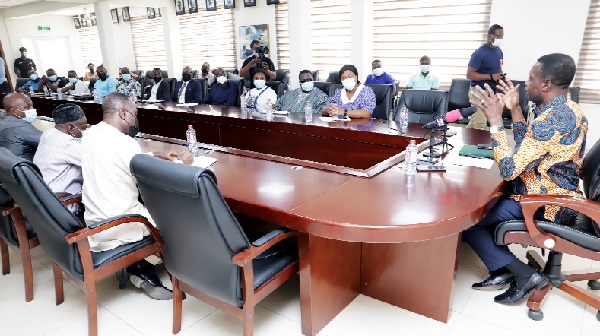
Polytechnics coming back - Dr Adutwum
Twelve new technical vocational education and training (TVET) schools have been approved for construction, the Minister of Education, Dr Yaw Osei Adutwum, has said.
“In fact, we have 12 new TVET schools that have been approved in this budget. Eight of them are post-secondary TVET schools so literally eight polytechnics coming.
Advertisement
“So polytechnics are coming back, eight of the 12 are post-secondary TVET schools, funding ready. Funding has been approved and constructions are about to begin,” he said during a meeting with representatives of non-governmental organisations (NGOs) in education last Friday in Accra.
Budget
Under the budget, he said there were 35 Science, Technology, Engineering and Mathematics STEM schools whose funding had been secured, adding that nine of them would be done this year.
“We have five STEM universities. So the regions that do not have universities may get two, STEM and TVET or the polytechnic and the funding is available because it has been sourced from abroad,” he emphasised.
The country previously had10 polytechnics, nine of which have been converted into technical universities.
According to Dr Adutwum, a lot was being done by the government in the area of education including equipping all the 35 National Vocational Training Institutes (NVTIs), saying that 95 per cent of the equipment was already in the country.
After bringing all the TVET institutions under the ministry, he hinted that within the next few years, “nursing training colleges would also be coming”
Speaking on a wide range of issues in the education sector, Dr Adutwum said the interface between TVET and STEM was super exciting since that was where the issues of robotics and artificial intelligence came in.
Teacher deployment
In the area of teacher deployment, Dr Adutwum indicated that there were surplus of teachers in the country and that the challenge had to do with deployment.
“It is not a supply issue. So the unions and the Ghana Education Service have been working on rural teacher deployment incentives. It is taking too long, the ministry is now stepping in, I’m bringing them together because we need to have the rural-teacher deployment incentive,” he emphasised.
The minister said every classroom deserved a teacher and that it was a firm commitment from him that every classroom would have a teacher.
Dr Adutwum also made mention of the teacher housing scheme which was being worked on to provide accommodation facilities for them.
“So, the point I am making is that in education you can’t do one thing and expect to see transformation. If you know that you have to do about 10 things at the same time for you to see results”
School administration
On school administration, he said data from the National Teaching Council showed that only 6.5 per cent of headmasters, headteachers and other school administrators had formal training in school administration.
He said that should not be the situation in the 21st Century “that you can become a headmaster but you have no formal training”
“So National Education Institute is something that will help us do that. So the ministry would do that and get all the agencies to get their people trained,” he said.
Communities of excellence
Dr Adutwum announced the introduction of a new initiative that would see the adoption of 100 communities for the implementation of a strategy that would boost education delivery.
Under the initiative known as; the Communities of Excellence, the initiative would ensure that 90 per cent of students each from the primary, junior high school and senior high school students improve academically.
“In those communities, we would introduce the 90,90,90 plan or strategy. What we are saying is that 90 per cent of the primary four students, when they take the National Standardised Test (NST), it would show that they are proficient in reading, writing and arithmetic by age 10. We want 90 per cent of junior high school students to transit to senior high school from that village and in that village we want 90 per cent with serious counselling to transit to university,” he said.
The minister called for the support of the NGOs which also indicated their readiness to offer their inputs.



